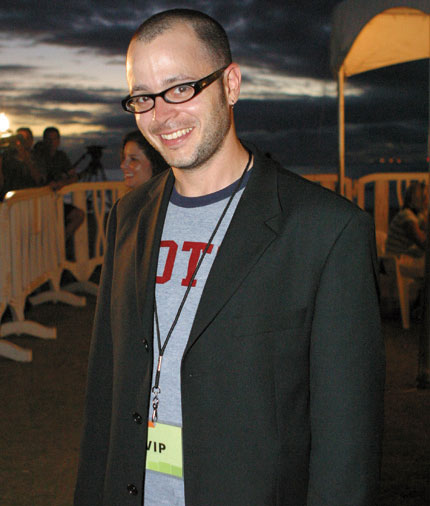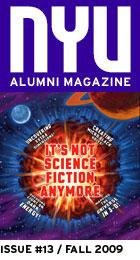television
Not So Lost
Damon Lindelof knows exactly how he’ll end the hit show he co−created, but he’s not telling
by Jason Hollander / GAL ’07
In the late 1970s, in the days before VCRs gained ubiquity, Damon Lindelof’s parents bought him some 16-mm prints of scenes from Star Wars because they were sick of taking their son to rewatch the film. He played the prints so much that they soon broke. Lindelof (TSOA ’95) admits that he probably had an “unhealthy obsession” with the space adventure, but it was also his first experience with the escapist power of mythology. “It made me want to be a storyteller,” he recalls.
So fans of ABC’s Lost might credit George Lucas, in part, for inspiring one of the most confounding, dizzying, and literary-infused shows ever to grace prime-time television. As co-creator, head writer, and executive producer, Lindelof will steer the series through its sixth and final season beginning in January 2010. The show, which has racked up Emmys, Golden Globes, and other awards, trails a group of plane-crash survivors on a mysterious tropical island who navigate a revolving door of obstacles—from global power struggles to personal demons and unwillful time travel. The characters are developed through nonlinear flashbacks that meticulously connect to the overall mystery.
Though Lindelof now enjoys deity-like status among many sci-fi fans—he also produced the recent movie blockbuster Star Trek—the road to fantasy guru was paved through some pretty mainstream storytelling; he previously wrote for the Don Johnson vehicle Nash Bridges, MTV’s Undressed, and the crime drama Crossing Jordan. But penning and producing the sequel to Star Trek (due out in 2011), along with developing a film based on Stephen King’s fantasy Western series The Dark Tower, should keep him in the myth-making business for some time.
NYU Alumni Magazine recently spoke to Lindelof about life at the helm of a network hit, confusion as a motif, and what comes next.
You were brought in by J.J. Abrams (Felicity, Alias, Fringe) to help develop the Lost pilot. What was it like dreaming up the show with him?
We met on a Monday, talked for two hours, and started to get really excited about it. That Friday afternoon we had written a 23-page outline, and on Saturday morning ABC picked it up.
So there was immediate chemistry.
I was like, “I can’t believe I’m in a room with J.J. Abrams,” and he was just treating me like I was his buddy. Within a week we were writing together, meeting at Starbucks, and hanging out. The mystical side of me says we must have known each other in a former life, but I think sometimes you just meet people and immediately click in a way where it’s like, “Oh…you.”
You sprinkle each show with references to literature, philosophy, and even ancient cultures. Do you ever think you’re giving the audience too many dots to connect?
I feel like for the audience member who wants to ski the black diamond, that run is available to them, but there’s also a bunny slope. And hopefully the episode makes sense. Here’s the story [to the Season 5 finale]: This guy’s trying to blow up a hydrogen bomb; this guy’s trying to stop him. But if you want the more advanced version of the show, there’s all these clues and nuggets, like Flannery O’Connor’s Everything That Rises Must Converge. Those things are there for the superfan.
So there’s a conscious effort to make Lost fans do some deep thinking, if they choose?
The show is not just called Lost because the island is lost or the people are lost in their lives. We want the audience to always feel a little lost, too, a little disoriented. As opposed to a cop show where you know the objective is to get the bad guy, or a hospital show where the objective is to save the patient, you don’t know what the objective is on Lost. Our characters don’t even know; they’re trying to figure it out every week. Next [season] will be a slightly different experience.
Speaking of which, fans and TV writers are constantly speculating about how it will all end this spring. Any secrets you might want to leak to your fellow NYU alums?
[Laughs] Mum’s the word.
I had a feeling you’d say that. So you’re about to wrap up this monumental TV series, you’ve just produced Star Trek…what’s left on your creative wish list?
It’s all gravy at this point. In my heart and in my soul I am still a fanboy myself, and the only standard I ever hold any project I’m working on to is: If I were 11 years old, would I be into this?
Photo Courtesy of NAB







